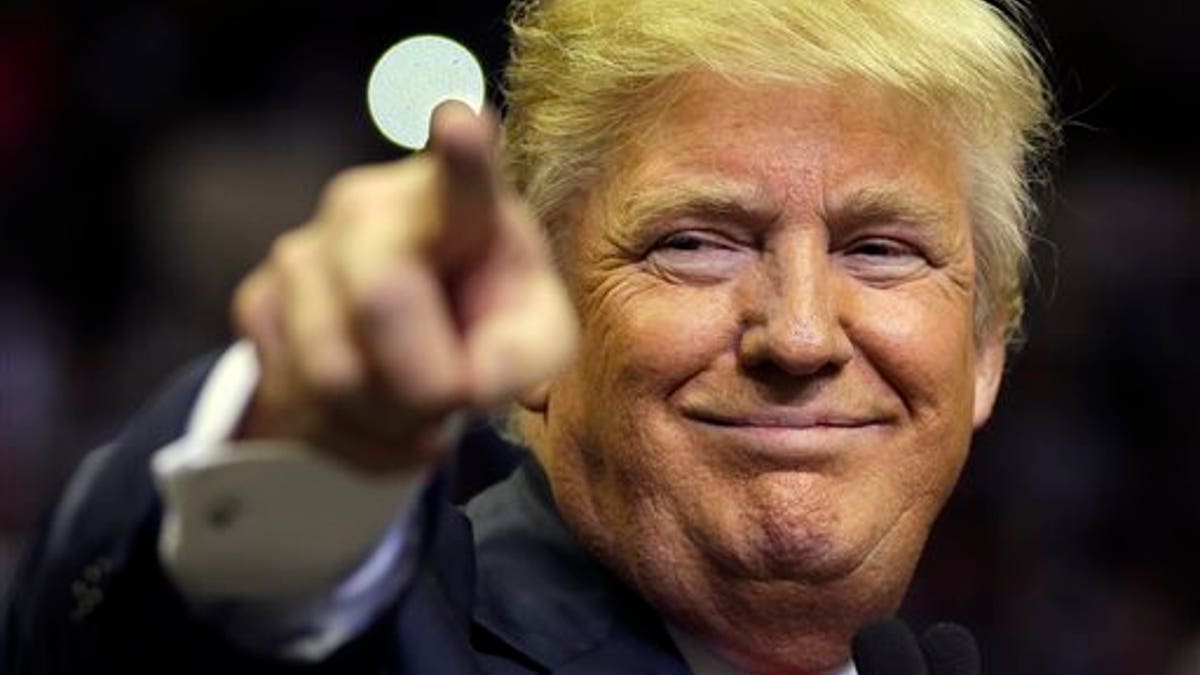
Republican presidential candidate Donald Trump points at a supporter during a rally Friday, Feb. 12, 2016, in Tampa, Fla. (AP Photo/Chris O'Meara)
Last summer Donald Trump was asked: “Have you ever asked God for forgiveness for your actions?” Trump replied, “If I do something wrong…I just try and make it right. I don’t bring God into that picture.”
Easter, the most important day of the year for Christians, reminds me just how wrong Trump’s answer is—on so many levels.
Easter is the time of year when we pull out all the stops to celebrate the death, burial and resurrection of Jesus Christ.
Symbols of the great forgiveness—the old rugged cross and empty tomb—will be preached passionately from the roughly half-a-million pulpits across the country and countless others around the world this weekend.
The great forgiveness tells the simple, yet profound message of God’s love. Jesus paid off our debt to God when He died on the cross. His selfless act gives everyone access to God’s pardon for their many sins. This forgiveness is not automatic. It must be humbly requested. Of course,
Trump’s answer reflects his personal reality.
My criticism of Trump’s answer is not political. I’m a pastor with a congregation of Democrats, Republicans, and independents. I am forced to reach across the aisle every Sunday.
This Easter I will call the faithful and the newbies to examine the reality of God’s pardon. Otherwise they cloud the issues and risk denying themselves access to the great forgiveness.
The apostle Paul wrote: “For the wages of sin is death, but the gift of God is eternal life in Christ Jesus our Lord” (Romans 6:23). The great forgiveness is intended to pardon us from the guilt and shame of all our wrongdoings. It is bipartisan. Easter is a testament to that fact.
If I had the opportunity to speak with The Donald—the proverbial dealmaker, I would say: “Why leave such a deal on the table? God, the consummate Deal-Maker is offering you an incredible proposition—your sin for His pardon. If you really want to make it right, that’s how you make it right. Make the deal! Accept the great forgiveness.”
Now, I’m asking you the same question. What’s stopping you? Easter is a great time to slow down and consider your need for the great forgiveness.
From my experience the deal breaker for many is pride. We want to right our own infractions. This is noble. But global wrongs—infractions against our Creator and painful to other people—require divine help. This is where we must rely on the wisdom found in most 12-Step recovery programs. It asserts: “We came to believe that a Power greater than ourselves could restore us to sanity.” To make this admission requires humility. Humility is my access code to the great forgiveness.
Easter reminds me that I cannot strut to Calvary. I must humbly come on my hands and my knees.
The great forgiveness gives you a fresh start. It cleans the slate. God’s pardon is a game-changer. When you experience it, you’ll know it because it’s transformational.
In 1929, a man named George Wilson robbed a mail carrier and killed him. He was sentenced to die but received a presidential pardon. To the surprise of the Oval Office, Wilson rejected the pardon. Imagine that. The president of the United States had set him free but Wilson said “No!” The case went to the Supreme Court. The issue is this: If the president of the United States gives you a pardon, aren’t you pardoned?
Chief Justice Marshall rendered the decision. It simply read: “A pardon rejected is no pardon at all. Unless the recipient of the pardon accepts the pardon, then the pardon cannot be applied.”
This Easter, many people will hear a sermon on the great forgiveness—God’s offer to pardon you from all of your sins. For some it will be the first time the message is understood; others, the umpteenth time. Many will receive the pardon while other others like Wilson and Trump will reject it. What will you do?








































